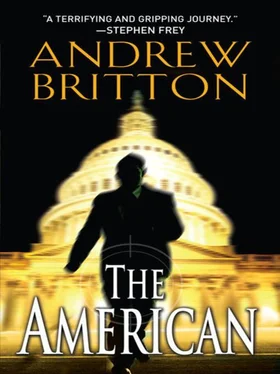Andrew Britton - The American
Здесь есть возможность читать онлайн «Andrew Britton - The American» весь текст электронной книги совершенно бесплатно (целиком полную версию без сокращений). В некоторых случаях можно слушать аудио, скачать через торрент в формате fb2 и присутствует краткое содержание. Жанр: Триллер, на английском языке. Описание произведения, (предисловие) а так же отзывы посетителей доступны на портале библиотеки ЛибКат.
- Название:The American
- Автор:
- Жанр:
- Год:неизвестен
- ISBN:нет данных
- Рейтинг книги:3 / 5. Голосов: 1
-
Избранное:Добавить в избранное
- Отзывы:
-
Ваша оценка:
- 60
- 1
- 2
- 3
- 4
- 5
The American: краткое содержание, описание и аннотация
Предлагаем к чтению аннотацию, описание, краткое содержание или предисловие (зависит от того, что написал сам автор книги «The American»). Если вы не нашли необходимую информацию о книге — напишите в комментариях, мы постараемся отыскать её.
The American — читать онлайн бесплатно полную книгу (весь текст) целиком
Ниже представлен текст книги, разбитый по страницам. Система сохранения места последней прочитанной страницы, позволяет с удобством читать онлайн бесплатно книгу «The American», без необходимости каждый раз заново искать на чём Вы остановились. Поставьте закладку, и сможете в любой момент перейти на страницу, на которой закончили чтение.
Интервал:
Закладка:
The phone went dead in her ear before she could respond. As Ryan shifted into fourth gear and punched the pedal, she slunk back down in the seat as far as she could go, absolutely positive that they would be dead long before reaching their destination.
Connecticut Avenue outside the Kennedy-Warren was filled to capacity with emergency-service vehicles, fire engines, and the unmarked government sedans that belonged to the FBI personnel on the scene. Piles of dirty ice had accumulated at the curb, and the pavement beneath their feet was slick. A stiff wind whipped between the vehicles, making the temperature seem even lower than it really was. Ryan thought it was probably less than 30 degrees, making him wish he had brought more protection from the harsh weather than a worn, black-leather jacket. To make matters worse, he and Kharmai were forced to wait for five minutes while their identification was confirmed by the ponderously slow police officers maintaining the perimeter.
Naomi was staring at an unmarked Chevrolet transport van that was at least 25 feet long. The rear doors were open, and Kealey could easily make out the switchboard inside, as well as a gasoline-powered generator bolted to the floor. The vehicle was surrounded by men in blue coveralls and body armor, each holding an HK MP10 down by his side, except for the few who carried shotguns chambered with entry rounds. The men were quietly conversing among themselves; some chewed gum rapidly, fingers tapping impatiently on the trigger guards of their automatic weapons. They tried to hide their tense faces, mostly failing in the effort.
Ryan recognized the stress-relieving rituals and knew immediately that they would get the job done. He hoped it wouldn’t come to that.
“Do you think they’re going in already?” Naomi asked.
“Jesus, I hope not,” he replied, gesturing in the direction of the news vans held beyond the perimeter. Satellite dishes were attached to the roofs of the vehicles. “If he’s actually up there, he can see everything we’re doing. This can’t get any worse than it already is.”
Naomi spotted a heavy, angry-looking black man wearing a blue FBI parka over a white dress shirt and suit pants. He was shouting at a small cluster of agents, jabbing his finger into the air emphatically. She caught his eye and walked in his direction, Kealey trailing behind her. The agents scattered on their approach.
“Naomi. I thought you might turn up,” the man said warily. She smiled pleasantly, ignoring the tone of his voice.
“Luke Hendricks, Ryan Kealey. Luke here is the ASAC for the Washington field office. Why didn’t we hear about this?” she asked bluntly. The generous smile was gone from her face.
“Hey, you said it. I’m the Assistant Special Agent in Charge; that means there is about a billion people telling me how to do my job. I’m not the guy who decides what we share with other agencies,” Hendricks responded.
Naomi was looking around. “Where’s the ADIC?” she asked. She was referring to the Assistant Director in Charge, who runs the field office in major cities such as Washington, D.C., and Los Angeles.
“In the hospital, believe it or not. Double-bypass surgery — pretty convenient, huh? I think he must have seen this one coming.”
Kealey appraised the FBI agent quickly, approving of what he saw. Hendricks had a right to be angry; he had been placed in a difficult situation with very little oversight, and the unexpected presence of the reporters only compounded the problem. All the same, Ryan thought that he looked like a man able to make quick decisions under pressure.
“What do you have at this point?” Ryan asked.
“Not much. Confirmation that he’s in there, of course. The desk manager saw him go up twenty minutes before we walked through the door. We haven’t started a dialogue yet, and I’m beginning to think it won’t happen. I’m under pressure to send those guys in,” Hendricks said, waving vaguely in the direction of the SWAT team standing by. “Personally, I’d like to exhaust all other possibilities before I give them the go-ahead. My guys are pretty pissed off, but you’d never know it looking at them. Right now, I don’t see this man coming down alive unless he gives it up — if he eats a bullet, then we’ll never figure out what he was up to.”
Ryan looked up at the towering building, then back to Hendricks. He didn’t say anything. Personally, he thought that it was a mistake to assume anything about the man on the eighth floor of this apartment complex, Congressional staffer or not.
“How did you get a line on Shakib?” Kealey asked.
Hendricks focused his attention on the man standing slightly behind Naomi Kharmai. Kealey was of medium height, with black hair on the long side, a lean, muscular build, and dark gray eyes that were somewhat unnerving in their intensity.
More than a decade earlier, Luke Hendricks had served as an infantry squad leader in the 82nd Airborne out of Fort Bragg. He had seen action in the Gulf, and had been awarded the Soldier’s Medal for pulling two young privates out of a minefield close to the end of his tour. Hendricks rarely talked about the experience, but he knew the difference between a soldier and someone who had served in the military. He could recognize a soldier when he saw one.
“Obviously, we looked at nationality first. It made sense to check out anybody affiliated with Iran working on the Hill. That only took us so far before someone came up with the idea to look at travel plans. Shakib vacationed annually in Valencia. After a day or two, he’d charter a flight to Bucharest under a different name, and then on to Tehran. It was a low-risk strategy with minimal contact, suggesting the possibility that he was a sleeper. Who knows what else he’s given up over the years? A lot of heads are going to roll when the whole thing goes public.”
After Hendricks stated the obvious, he paused for a moment. “He knows we’re out here. If we were completely off track, then he would have given it up a long time ago. This is the guy.”
“And you couldn’t keep this quiet?” Naomi asked.
“I didn’t leak it, if that’s what you’re suggesting. A lot of people had access to this information,” he responded angrily.
“Not us,” she muttered.
High above the commotion, Michael Shakib was kneeling motionless on a prayer mat facing east. His head was bowed in supplication facing Mecca, a place he had not visited, nor would ever visit, although the hajj was specifically required by the fifth pillar of his faith.
Shakib’s features were distinctly Arabic, which was not surprising as he had been born in Qom before his parents emigrated to California in 1979, despite the immense difficulties associated with leaving the country after the Revolution. All his life he had been exposed to the prejudice and animosity felt toward Islam by his adopted homeland, but had never once considered leaving the faith. He was painfully aware that his appearance alone inspired distrust in the faces of the people he passed each day. This particular prejudice was largely imagined, however, for Michael Shakib was not an unattractive man.
The sharp green eyes flecked with brown were his most noticeable characteristic, framed by perfect olive skin. Thick black hair was set off by his straight white teeth, a feature most uncommon in the poverty-stricken areas of Iran from which he had risen into the world.
In reflective moments, Shakib could concede that he had been bestowed certain benefits denied to many of his peers. He was grateful for these advantages, yet despised them at the same time. What had given him the right to be so successful, to enjoy the wealth and privilege usually accorded to only the most elite of America’s youth? On a warm, still night in Barbados four years earlier, he had met someone who would change his path in life, who would give him purpose. It had not been a chance encounter, but that fact had never been revealed to Michael Shakib. Until that first meeting, he had survived on his instincts and innate intelligence alone. It had been a useless existence. Despite his undeniable success, Michael had welcomed the opportunity to further such a grand cause, and was now prepared to make his greatest contribution.
Читать дальшеИнтервал:
Закладка:
Похожие книги на «The American»
Представляем Вашему вниманию похожие книги на «The American» списком для выбора. Мы отобрали схожую по названию и смыслу литературу в надежде предоставить читателям больше вариантов отыскать новые, интересные, ещё непрочитанные произведения.
Обсуждение, отзывы о книге «The American» и просто собственные мнения читателей. Оставьте ваши комментарии, напишите, что Вы думаете о произведении, его смысле или главных героях. Укажите что конкретно понравилось, а что нет, и почему Вы так считаете.












